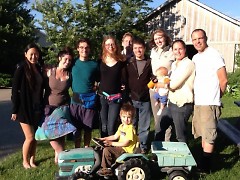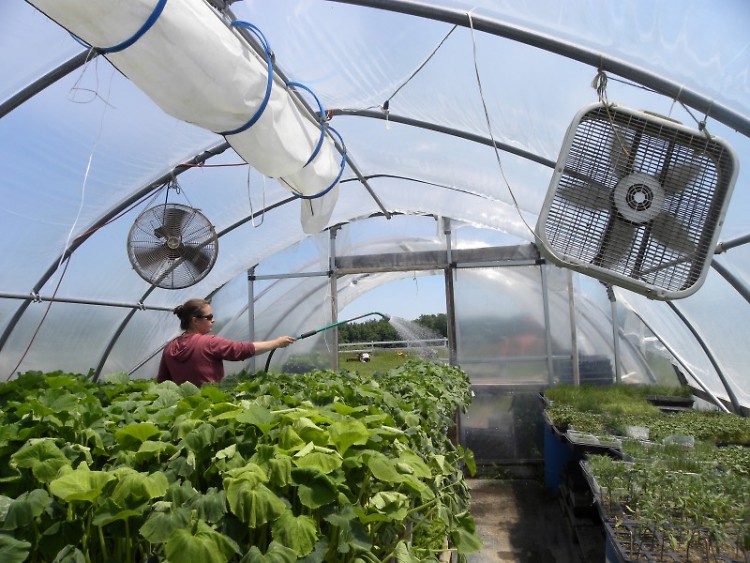From the beginning, self-sufficiency has motivated Rachelle Bostwick to move away from supporting large corporations in every way possible.
“Corporations don’t care about people,” Rachelle Bostwick says. “They care about money. And they don’t care about the environment, or what’s going to happen to it.”
Frustrated with this level of corporate control, Bostwick and her husband Andrew began to seek out space to start a farm. In 2008, Earthkeeper Farm was born.
“I was just young and naive,” Rachelle Bostwick recalls. “I thought, ‘I could just buy a farm! And I’ll raise my own food, and it’ll be a big ‘up yours’ to the corporations, and we’ll just have it all!’ But we’re getting there, you know? We’re just that much closer to self-sufficiency.”
“Knowing what’s going on” with her food is something that Bostwick and the Earthkeeper Farm crew takes seriously. Earthkeeper Farm is Stellar Certified Organic, a level of organic certification that ensures that growing practices are in line with not only the federal organic standards, but with farming methods that consider the lunar calendar, surrounding environments and other living creatures. This method, known as biodynamic farming, takes into account not more than just chemical fertilizers or ground conditions.
“In farming, biodynamic pays attention to the spirit, and how things are being done. And it doesn’t see the farm as an individual, but as an entity of its own is important as well. In that respect, we’re intentional in our work, and in what we’re doing,” Bostwick says. "You can’t just look at one single plant on the farm to understand it. You have to come and look at all of the different species that are here, and all the animals, the birds, the people. From the microbes in the soil up to the alignment of the planets.”
Intentionality has driven Bostwick to invest time and energy into raising animals on the farm as well. Fields are left "fallow," or uncultivated, for a season to give birds and other animals a home. The pigs, chickens and lambs on the farm provide not only dinner, but another way to keep Earthkeeper self-sufficient.
“We have a lot of scrap left over from the wash station,” Bostwick explains. “The [produce] that was too holey or too bitten up or whatever go right out to the chickens or the pigs so it just keeps it all on-farm, which is nice. It’s just a nice cycle.”
Earthkeeper grows over 50 crops in 300 different varieties to maintain biodiversity. Even though Bostwick maintains that biodynamic farming isn’t easy, she says she wouldn’t run Earthkeeper Farm any other way.
“[Biodynamic] is definitely better for the planet, and our customers, and everyone involved because you get a lot better, cleaner product, because we’re not using any chemicals in our production. But we wouldn’t want to use any chemicals, it’s not even like ‘oh we can’t because we’re certified organic,’ but why would we ever want to do that?” Bostwick explains. “We’d destroy all the soil microbes and all the things we depend on, and are working to preserve.”
Work is nothing new at Earthkeeper. The farm depends on help from everyone involved. This includes the Bostwick's oldest son Liam, the “official farm toddler,” who enjoys picking strawberries and eating them. The cycle of dependence, whether on scrap-eating pigs, or microbes in the soil, doesn’t stop with animals. At Earthkeeper Farm, relationships are more than encouraged. They’re essential.
“On our farm, we see the values of human and connections, and everyday existence, whether it’s a connection with the people that are working on the farm, with the customer or with the businesses we work with and the chefs that are there. Or, the connections with the different farmers, and the struggles that we share that we can help each other through. It’s the meaning of life right there. Connection. Partnership. Community.”
Partnerships with others have driven Bostwick to work toward making Earthkeeper more inclusive, with volunteer hours, monthly potlucks and WWOOFing. The Bostwicks believe that the experience of depending on one another isn’t one that can be bought.
“I think that partnerships are really important to building a successful anything...it’s going to become more apparent to people the importance of human connection. That’s why friends matter. That’s why these people you depend on in a day to day life like your farmer, or the person that takes care of your kids, teachers,” Bostwick says. “The people that take care of the basic needs in your life, and the needs of your family: that’s going to be more important than what kind of stocks you own. Money is king right now, and people think it’s the most important commodity. But it’s really not. People are the most important. People are the essence of life.”
The Rapidian, a program of the 501(c)3 nonprofit Community Media Center, relies on the community’s support to help cover the cost of training reporters and publishing content.
We need your help.
If each of our readers and content creators who values this community platform help support its creation and maintenance, The Rapidian can continue to educate and facilitate a conversation around issues for years to come.
Please support The Rapidian and make a contribution today.

